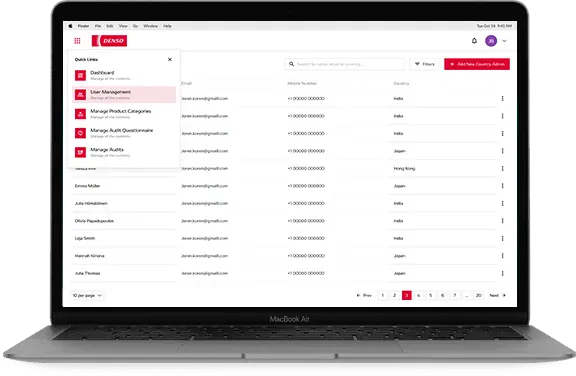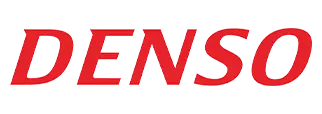Success Story
Developing a compliance management software solution for DENSO
Services Used:
About the client
Founded in 1949 and headquartered in Japan, DENSO is one of the world’s largest automotive suppliers of components offering advanced automotive technologies, systems, and products. With a vast clientele that includes industry giants like Toyota, Honda, FCA, General Motors, Ford, and Volvo, DENSO has established itself as a key player in the automotive industry.
DENSO’s vision is to create a future of mobility that facilitates the seamless movement of people and goods, eliminates accidents, promotes environmental sustainability, and enhances societal well-being.
Business Situation
Denso is dedicated to maintaining high-quality standards and has a process in place to ensure its products meet these standards. This process involves conducting regular audits on their network of service dealers worldwide.
However, the way they conducted these audits presented several challenges. The process was entirely manual, requiring the use of Excel spreadsheets for managing audit logs, which was not only time-consuming but also prone to errors and difficult to maintain. Moreover, it necessitated physical visits to each service dealer location, incurring substantial travel and operational costs.
The manual nature of the process made it difficult to track audit progress and results in real-time, leading to delays in identifying and addressing potential issues. Additionally, the requirement for on-site audits made the process inefficient, as it was not always feasible or practical to visit every location. This resulted in audits being skipped or delayed, posing a risk to the quality and compliance standards of the parts.
Given these challenges, our client sought a technology-driven solution to streamline their audit process. They were looking for a system that could automate the process, reducing manual effort and increasing efficiency.
To address these needs, our client approached Daffodil, a leading technology company known for its expertise in building digital platforms. They were looking for a customized solution that could meet their specific requirements and help them improve their audit process.
Through collaborative brainstorming sessions, Daffodil Software and Denso delineated a set of key requirements, which included:
- Conceptualizing and planning the entire development process for the compliance management software solution, including recommending the most efficient technology stack.
- Developing a web application that could automate audit progress and facilitate remote audits, reducing the need for on-site visits and making the process more transparent and flexible.
- Designing an intuitive UI/UX interface to ensure a seamless experience for all end users.
- Incorporating security features to ensure compliance with industry regulations and standards, with the ability to generate reports for regulatory purposes.
- Setting up the entire infrastructure and deploying the compliance management software on AWS.
The Solution
Our team of expert project managers, business analysts, software architects, and UI/UX designers initiated the engagement by carefully outlining the optimal platform architecture. We refined the functional requirements and crafted the product vision and development roadmap.
In consideration of the client’s stringent audit procedures, we selected the most efficient technology stack for the compliance management software solution. This included leveraging ReactJS for the front end, Node.JS for the back end, and AWS Services for the infrastructure.
To effectively address the complexities of the audit process, we designed workflows tailored to the client’s unique requirements. These workflows incorporated stages and processes that seamlessly guided users through the entire audit lifecycle, ensuring a systematic and efficient approach.
The application was crafted to cater to four distinct user roles: Main Admin, Country Admin, TM (Team Member), and DNSD (Denso Service Dealer).

Main Admin and Country Admin:
The web application employs robust email and password authentication, fortified with 2FA (Two-Factor Authentication) for enhanced security and mitigated risk of unauthorized access.
Main Admin and Country Admin share a vast array of features, ensuring comprehensive management capabilities within the compliance management software solution. Both roles encompass:
User management: The admin can manage (add/edit/delete/view) all users, assign multiple roles to a single user, and configure the user interface to display relevant fields based on the assigned roles. For instance, when adding a TM (Team Member), the interface presents fields specific to the TM’s role, such as employee ID and audit type (operational or repair). Conversely, when adding a Country Admin, the interface does not include fields related to audit types, as this is a task specific to the TM role. Moreover, when assigning multiple roles to a user, the form dynamically adjusts to include all relevant fields from each role.

Manage product categories: The admin can efficiently manage product categories, including adding/editing/viewing/marking as active/inactive for product and sub-product categories. Furthermore, the admin can add sub-product categories and assign them to specific countries and questionnaires, streamlining the categorization and organization of products for auditing purposes.

Manage audit questionnaire: The admin has the ability to manage audit questionnaires, such as adding/editing/viewing audit questionnaires. Additionally, the platform facilitates the creation and management of country-specific questionnaire versions. The admin can also select audit questionnaire types (operational or repair), ensuring a tailored approach to auditing.
One of the significant challenges faced by the Daffodil team was creating a complex UI that involved multiple nested sections within the questionnaire. Rendering all elements simultaneously resulted in high memory usage and sluggish interactions. However, after extensive brainstorming, we devised a solution that utilizes virtual scrolling to optimize performance. This approach dynamically renders only visible elements in the tree, ensuring a user-friendly interface for filling out questionnaires, which improves usability for both TM and DNSD users.

Manage audit list: The admin is equipped to plan audits, choose audit types, and assign TMs to perform audits. Additionally, they can manage the audit lifecycle, preview audit forms, and download audit data in PDF/Excel format. The admin can also view audit details, including evaluation status and evidence in the form of recordings, snapshots, and videos.

Dashboard: The platform provides a dynamic dashboard to the admin, displaying pertinent figures such as the total number of audits versus completed audits, a bar graph of total questions asked to the total number of service dealers, and grading and radar graphs for comparing multiple variables in categories and assessing the quality.
The primary distinction lies in the scope of audit management responsibilities. While the Main Admin retains oversight of audits across all regions, the Country Admin focuses solely on managing audits within their designated country. This differentiation ensures that Country Admins are exclusively responsible for overseeing audits in their specific geographical area, while the Main Admin maintains a broader purview across all regions.

Team member (TM):
TM users access a dedicated dashboard with comprehensive audit management capabilities. With their primary role being to conduct audits, they utilize the compliance management application to:
◉ Set audit modes, including Face-to-Face (F2F) Audit, Remote Audit, and Self Audit.
◉ Upload evidence such as videos or snapshots for audit evaluation.
◉ Set audit status, including options such as in-progress, on hold, or pending, depending on the situation.
◉ Send reports to service dealers, edit audit forms, and even align them for re-audit.

Moreover, the web application facilitates TM users in conducting remote audits through integrated video conferencing. During these sessions, the platform is incorporated with the audit form, allowing the TM to conduct the audit and fill the required fields simultaneously. This functionality is available to both Main Admins and Country Admins, giving them the option to join the call for oversight or assistance.
To enable remote audits, we utilized the Twilio Video Service for implementing the video conferencing solution. To maintain data security and storage integrity, we integrated our S3 bucket with Twilio. This ensured that all evidence/recordings were securely transferred to our S3 bucket, mitigating any risks associated with data storage on Twilio servers. This approach underscored our commitment to data privacy and compliance with stringent security standards.

Denso Service Dealer (DNSD):
Service Dealer (DNSD) users, as the primary recipients of audits, do not require a login portal. Their interaction with the compliance management platform is limited to completing audit forms or participating in video calls. The platform provides DNSD users with the ability to conduct self-audits by filling out the required fields and submitting evidence. This feature enables DNSD users to actively participate in the audit process and offer valuable insights into their operations. The DNSD user interface is designed to be intuitive and user-friendly, ensuring that users can easily navigate the platform and efficiently complete their audits.

Setting up the AWS infrastructure
Our team meticulously configured the required services to support the compliance management software solution. This involved selecting and setting up AWS services such as EC2 instances, S3 buckets, RDS databases, and VPC networking to ensure a seamless and scalable environment. We also implemented security measures such as IAM roles, encryption, and network ACLs to protect sensitive data and ensure compliance with industry standards. Once the infrastructure was set up, we deployed the web application on AWS, ensuring that it was properly configured and optimized for performance. Throughout the process, we collaborated closely with the client to ensure that the infrastructure met their specific requirements and exceeded their expectations.

The Impact
The compliance management software solution we developed for our client had a major impact on their audit process. It brought about a significant increase in operational efficiency and flexibility. By automating many of the audit tasks, the application greatly reduced the time and resources needed for audits. Additionally, the real-time monitoring feature was particularly beneficial, enabling the client to identify and address issues promptly. This resulted in an overall improvement in the quality and compliance standards of their products. Moreover, the transition to remote audits led to substantial cost savings by eliminating the need for on-site visits. Recognizing the positive outcomes of our dedicated efforts, our client has extended their trust by assigning us additional projects, and we are enthusiastic about delivering excellence once again.
Read Related Case Studies
Get in Touch
Sign up for a 30 min no-obligation strategic session with us
Let us understand your business objectives, set up initial milestones, and plan your software project.
At the end of this 30 min session, walk out with:
- Validation of your project idea/ scope of your project
- Actionable insights on which technology would suit your requirements
- Industry specific best practices that can be applied to your project
- Implementation and engagement plan of action
- Ballpark estimate and time-frame for development








